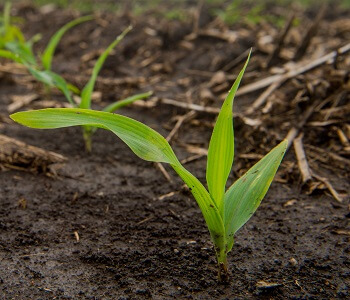HAS THE RECENT FROST DAMAGED MY PLANTED CROP?
May 11, 2020

Recent below freezing weather conditions created some agronomic concern around newly planted crops and raised the question of, “Should I expect to replant?” To put it simply, for most of our area, temps around freezing should not be considered worst case scenario. Because the emergence level is low, the risk is limited. For the most part, only a small amount of corn has emerged, and soybeans are just getting planted and have not emerged. Wheat is emerged but is relatively resistant to freeze damage.
The commonality among all crops is this: We need to take a patient approach and evaluate crops again late this week when temperatures warm and growth takes off again. Even with frost on emerged corn and wheat, most plants will likely recover and will have a better chance of production than reseeding. Inspection of plants in a few days is critical!
Crop considerations when evaluating frost impact:
Wheat
The commonality among all crops is this: We need to take a patient approach and evaluate crops again late this week when temperatures warm and growth takes off again. Even with frost on emerged corn and wheat, most plants will likely recover and will have a better chance of production than reseeding. Inspection of plants in a few days is critical!
Crop considerations when evaluating frost impact:
Wheat
- Emerged spring wheat plants are quite tolerant of frost. As long as the crown is not damaged, the seedlings will recover quite well. Growing points are still below ground at this time.
- Winter wheat is tolerant of freezing temps through tillering (down to the upper teens). If the plants have already jointed, the growing point is above ground and more vulnerable to injury by the freeze. Split open jointed plants and look for the very small developing wheat head. If that is still healthy (greenish-white), the plant will likely continue to develop normally.
- The growing point of corn is under the ground until V6, so it will be protected from frost. The above ground tissue may get frosted, but the corn plant should grow back with little to no stand or yield loss.
- Non-emerged corn plants may have the coleoptile “bend” sideways with cold soil temps at the surface. Corn that has not emerged will return to vertical growth as soil warms again.
- Emerged corn is susceptible to frost, but usually grows through the dead tissue in a few days. The key here is to be patient and wait for the push of new leaves through the top of the plant.
- Soybeans that have not emerged (including hypocotyl crook) will be OK.
- Soil moisture, soil type and previous crop residue can influence freeze tolerance.
- Soybean injury or death from freezing temperatures is more likely in low areas.
- Soybeans in the cotyledon stage are more freeze tolerant than later stages.
- Plants frozen below the cotyledons will be dead. Soybean plants with a live growing point remaining can survive. New growing points are at the base of each leaf and cotyledon.
- Yield loss will be related to stand loss and soybeans compensate well for reduced stands.
- You will need to wait several days to adequately assess stand loss.